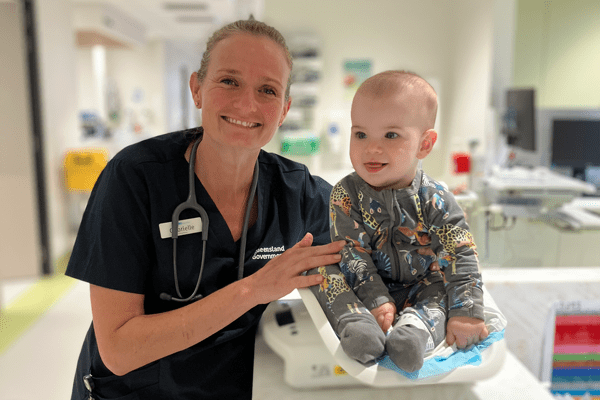Triage process contributes to high quality care

Triage Nurse Gabrielle and baby Oscar
When a patient visits the Caboolture Satellite Hospital Minor Injury and Illness Clinic, their assessment by the triage team is one of the most important first steps undertaken to ensure that patients receive the most appropriate care.
Since opening in August this year, over 4500 patients have presented to the Minor Injury and Illness Clinic which offers a range of non-life-threatening treatments for lacerations, burns, minor fractures, sprains and strains, sporting injuries, minor respiratory illnesses and eye injuries.
According to Caboolture Satellite Hospital Clinical Nurse Gabrielle, triage is an important tool that is based on a person’s clinical presentation and helps to prioritise their care.
“Triage a highly specialised skill and clinical process that involves taking the patient’s history, looking for signs of serious illness and injury and using training, knowledge and very well-developed people skills to help decide on how a person should be further managed, assessed and stabilised,” said Gabrielle.
“Treatment time is based on triage and the urgency of the condition, meaning that those who require care most urgently will be prioritised. This helps ensure everyone gets the care they need in a safe and timely manner.”
According to Caboolture Satellite Hospital Minor Injury and Illness Nurse Unit Manager Amanda, nearly 90 per cent of the clinic’s nursing staff have completed the Emergency Triage Education Kit, a national training package.
This training ensures all staff utilise comprehensive theoretical and practical knowledge when assessing and triaging patients. Patients may forget to provide key details or overlook facts that can be detrimental to determining the appropriate treatment.
“This is why nursing staff complete mandatory standardised training to ensure correct and fair treatment is provided,” said Amanda.
“At the Minor Injury and Illness Clinic, we understand that any visit to a health facility when unwell can at times be stressful and daunting.
“As a team we focus on ensuring the highest level of care is provided in a supportive and safe environment.”
Amanda’s top suggestions for patients with non-urgent conditions are:
1: If you need help for something that is not life threatening or serious, the first point of call should always be your own GP. This ensures continuity in your health care journey.
2: Your local pharmacy is a great source of advice and can provide over the counter treatments for conditions like simple coughs and colds or small rashes.
3: If you are unsure, call 13HEALTH (13 43 25 84) for health information, advice or referral services. This service is available 24 hours a day, seven days a week and health staff can provide advice on symptoms and conditions, who to talk to and where you can seek medical treatment if required.
4: If you present to the Minor Injury and Illness Clinic, remember you will be treated as soon as possible, however, someone who arrives after you may be seen before you if their condition is more urgent.
